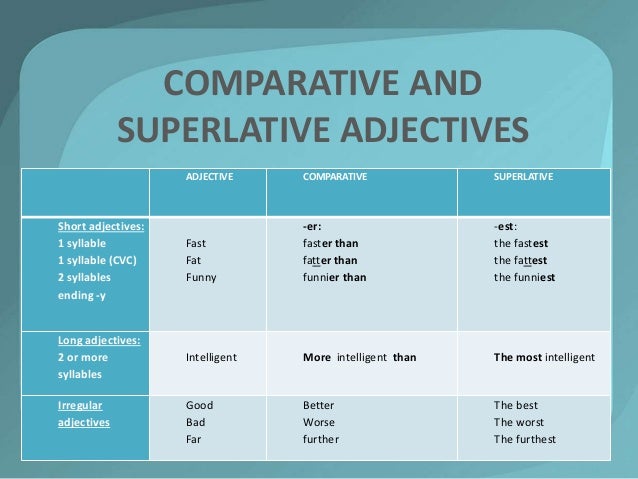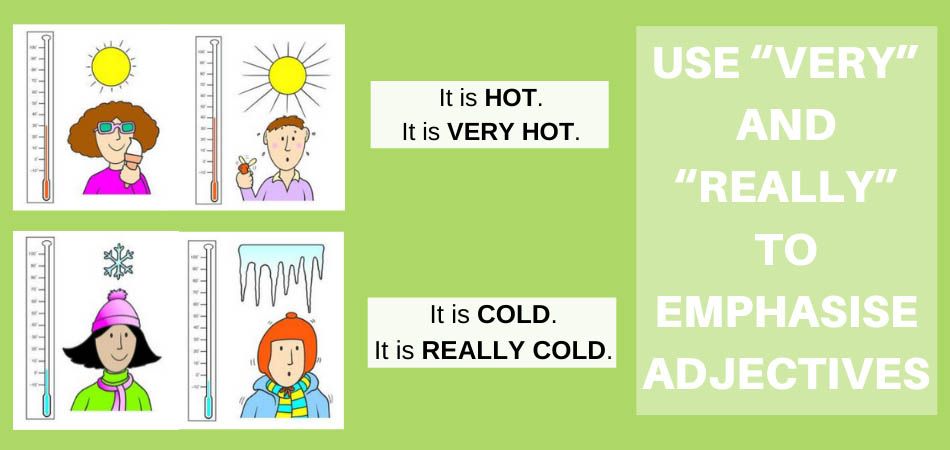Really Adjective
- List Of Adjectives Pdf
- Really Adjective
- 100 Descriptive Adjectives
- Powerful Adjectives List
- Really Cool Adjectives
A set smile or expression does not change, and often hides what someone is really thinking. Shamefaced adjective. With an expression that shows you feel ashamed about something. Slack-jawed adjective. Informal with your mouth open. Used about the expression on people’s faces. Showing that you think something. This is explained above. 'tiny' is an extreme adjective and we don't generally use 'very' with extreme adjectives, though we do sometimes use 'really' or 'absolutely' to modify them. It's true that 'very' and 'really' effectively have the same meaning, and so I can appreciate that this is a little confusing.
Adjective or Adverb
Adjectives and adverbs are modifying words.
Incorrect: She did good on her exam.
In the sentence above, the verb did is modified by an adjective good, when it should be modified by an adverb well.
Correcting Adjective or Adverb Problems
Correct: She did well on her exam.
Many adverbs are formed by adding a suffix -ly at the end of an adjective:

Change close to closely
Change patient to patiently
Some adverbs and adjectives are, however, identical in form:
| Adjectives | a rough draft | Adverbs | play rough |
| first exam | ride first | ||
| right hand | turn right |
An adjective is a part of speech that modifies a noun or pronoun.
Adjectives usually tell what kind, how many, or which about nouns or pronouns.
An adverb is a part of speech that modifies a another adverb, a verb, or an adjective. It is often recognized by the suffix -ly at the end of it.
Adjectives usually describe an action in terms of how, when, where, and to what extent it occurred.
To avoid an error, identify what word the adverb or adjective in question modifies. If the word modified is a noun or a pronoun, use an adjective. If the word modified is a verb, an adjective, or another adverb, use an adverb to modify it.
Sometimes an adverb is confused with an adjective similar in meaning.
Bad or Badly

Bad is an adjective used with linking verbs such as feel, seem, be, look, etc.
Incorrect: I feel badly that he is not taking part in the game.
Correct: I feel bad that he is not taking part in the game.
Badly is an adverb used to modify action verbs.
Incorrect: Sometimes Hollywood romance ends bad.
Correct: Sometimes Hollywood romance ends badly.
Calm or Calmly
Calm is an adjective, and it is used to modify nouns and pronouns. It is also used with linking verbs.
Incorrect: She appeared calmly after the accident.
Correct: She appeared calm after the accident. Lecroy port devices driver download for windows 10.
Calmly is an adverb that modifies verbs.
Incorrect: She tried to be brave and take the bad news calm.
Correct: She tried to be brave and take the bad news calmly.
Easy or Easily
Easy is an adjective used to modify nouns and pronouns. It is also used with linking verbs.
Incorrect: The assignment looked easily.

Correct: The assignment looked easy.
Easily is an adverb, and it is used to modify verbs.
Incorrect: The players were moving easy around the field.
Correct: The players were moving easily around the field.
Good or Well
Good is an adjective. It is also often used with linking verbs.
Incorrect: It felt well to score an A on the final.
Correct: It felt good to score an A on the final.
List Of Adjectives Pdf
Well, when used as an adjective, implies 'in good health.' When used as an adverb, well means 'expertly.'
Correct: My grandmother looks well even now in her eighties.
Incorrect: My friend plays the piano good.
Correct: My friend plays the piano well. (expertly)
Real or Really
Really is an adverb, and it modifies other adverbs, verbs, or adjectives. It has a meaning of 'very.'

Incorrect: Students did real well on the midterm.
Correct: Students did really well on the midterm.
Real is an adjective, and can be used to modify nouns or noun phrases. It has a meaning of 'true or genuine.'
Incorrect: Students took a really midterm last week.
Correct: Students took a real midterm last week.
Really Adjective
Slow or Slowly
Slow can be used as an adjective and as an adverb. In the first example, slow is an adverb and in the second one, it is an adjective.
Correct: The traffic is moving slow. This is a slow dance.
Slowly is only an adverb. It can replace slow anywhere it is used as an adverb. Slowly also appears in sentences with auxiliary verbs where slow cannot be used.
Incorrect: He has been slow recovering from his knee injury.
Correct: He has been slowly recovering from his knee injury.
Adverb Placement in Sentences
100 Descriptive Adjectives
Sometimes, the use of a certain adverb requires the inversion of the subject and the verb. If a sentence begins with a negative adverb or an adverb with restrictive meaning, it must have an inverted word order.
Correct: Never before have I encountered such persistence in a student.
Correct: Seldom do we come across such talent.
Some other adverbs with restrictive meaning that require inversion of the verb and subject are:
Powerful Adjectives List

Really Cool Adjectives
- hardly ever
- hardly.. when
- in no circumstances
- neither/nor
- no sooner.. than
- not only
- nowhere
- Grammar
